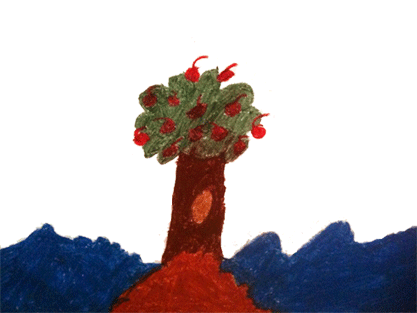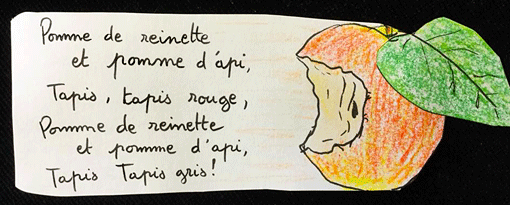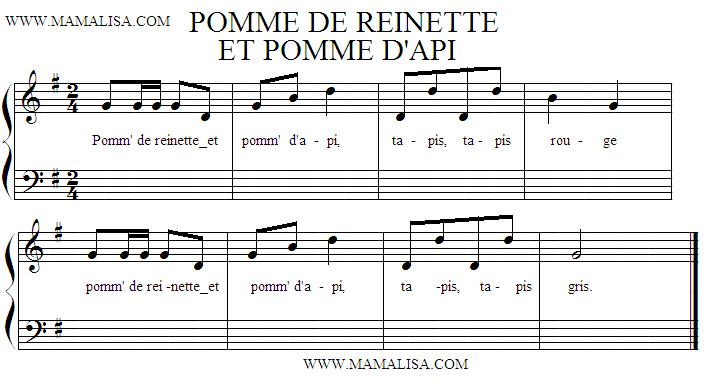Pomme de reinette et pomme d'api
This song traveled to different places in the French-speaking world and also out of it. It got altered during the process as you can on our Pomme de reinette et pomme d'api page where you'll find different versions.

Pomme de reinette et pomme d'api
Pippin Apple and Lady Apple
Chanson enfantine
Children's Song
(French)
(English)
Pomme de reinette et pomme d'api
Tapis, tapis rouge
Pomme de reinette et pomme d'api
Tapis, tapis gris.
Pippin apple and lady apple*,
Carpet, red carpet,
Pippin apple and lady apple,
Carpet, grey carpet.
Notes
*Lady apple (not Pink Lady) is one of the oldest varieties of apples.
Here's another version of this song that is sometimes used by French kids as a counting-out song (like the English rhyme Eenie, Meenie, Miney, Mo).
Pomme de reinette et pomme d'api,
D'api, d'api rouge,
Pomme de reinette et pomme d'api,
D'api, d'api gris.
Cache ton poing derrière ton dos
Ou tu auras un coup d' marteau.
Literal English Translation:
Pippin apple and lady apple,
Red, red lady apple,
Pippin apple and lady apple,
Grey, grey lady apple.
Hide your fist behind your back
Or you'll get a hammer blow.
Monique wrote, "I remember that we would add 'sorti!' (out!) at the end to eliminate one kid."
*******
This song used to have a first part. It was collected in Folklore de l'Ille-et-Vilaine (Brittany, Western France) by Adolphe Orain in 1897. The song then went…
Je suis fruitière,
Bon éventaire,
Ma mère en mourant
M'a laissé cent francs.
C'est à la halle
Que je m'installe,
C'est à Paris
Que je vends des fruits.
Pommes de reinette
Et pommes d'apis,
D'apis, d'apis rouge,
Pommes de reinette
Et pommes d'apis,
D'apis, d'apis gris.
English Translation
I'm a fruit seller,
Good stall,
My mother when dying
Left me a hundred francs.
It's in the market building
Where I set up,
It's in Paris
Where I sell fruit.
Pippin apple
And lady apple,
Red, red lady (apple),
Pippin apple
And lady apple,
Grey, grey lady (apple).
Game Instructions
Bring down one fist to tap the other then alternate fists to the tempo of the song. On "Cache ton poing derrière ton dos" (Hide your fist behind your back), hide a fist behind your back then take it out and hit the other fist on the last syllable of the song as if you were hammering it.

Comments
Recommended to sing while cooking a delicious Tarte Tatin! (Click the link for more info.)
*****
Monique Palomares wrote the following about this song...
About the Name of the Apple and Where it Grew:
Pomme de reinette is a russet apple and pomme d'api has indeed no English translation: the apple was named "d'api" because it's said to have originated in a forest in Brittany called "forêt d'Apis" that no longer exists and that no longer existed when this variety of apples was first mentioned in print in 1628. Now... it may have existed but the author may not have known about it! Among the different varieties of api apples, there are red ones and grey ones, hence "d'api rouge" and "d'api gris", so the translation would be "red Api apple" and "gray Api apple".
The lyrics shifting from "d'api rouge" to "tapis rouge" (red carpet) is easily understandable if you consider that children aren't likely to know the names of fruit varieties when they (the fruit varieties) don't grow near where they live. Ditto for "pomm' de reinette". If I refer to my own experience, I grew up in a vineyard area and grapes had different names known to us kids while apples were only apples. Even now that I'm much older, pineapples are just pineapples, mangoes are just mangoes etc... though if you look at the lyrics to the songs from where mangoes grow... it's much different in places where they grow. So... the song might have originated in Western France (Brittany, Normandy, Vendée) where the variety of apple was probably known more than any other area.
About the Tune:
In the book, Comptines de langue française (Seghers, Paris, 1961), the song is said to be found all over France + Belgium, Switzerland, Canada, La Réunion... There are many variants -even a "Spanish" one in Venezuela.
One tune was first in print in 1821 in Paris, but it seems there are many tunes and that the song was already known before this tune was written down.
Monique's Experience with this Song:
When I was a child we used it as a counting-out rhyme and would add "Sorti!" at the end, splitting "sorti". The one on which "ti" fell went out and the song was repeated over and over again until there was only one left – that one was "It". We would also bounce a ball to the song -without "sorti". I also remember that for a looooong time this "pomm' de reinett' et pomm' d'api" was all Greek to us because our current version went "Pomparinett' et pontapi..." which is absolutely meaningless, and we also had the other lines as "tapis, tapis rouge" / "tapis, tapis gris".
*****
There's an Italian version of Pomme de reinette called Ponte Ponente.


Thanks!
Thanks!
Thanks!
Thanks and Acknowledgements
Many thanks to Blanca Castilla for contributing this song that she remembers from France. Thanks also to Monique Palomares for translating and recording this song, for providing the midi, the sheet music and the commentary.
Thanks to Lila for the wonderful illustration!
Many thanks to Marion Ségissement for the 2nd illustration!


























